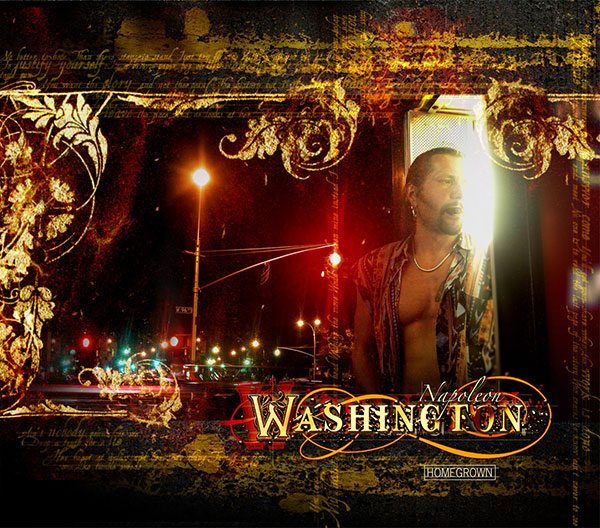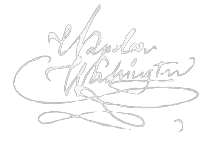Homegrown
NAPOLEON WASHINGTON

©2006 Sepia Prod -All rights reserved.
Homegrown is Napoleon Washington’s second album. Featuring 12 original compositions and one Skip James song, it has been recorded in New York and mixed in Switzerland. As the result of a love affair between Washington and the blues, Homegrown follows the debut album «Hotel Bravo» and continues it exploration work.».

Executive production and coordination : Eric «Prod» Laesser for Sepia Productions
Produced by : Napoleon Washington
Piano and Hammond : Spencer Limbough
Bass and electric upright : Chuck Schmalleger
Drums : Isaac Castner
Percussion : Jeffrey Baldacci
Additional drums : Cletus Berg
Recorded at : Temple Sound Brooklyn NY
Additional recordings at : Keith Brayer Studio NYC
Mixed at : studio mecanique La Chaux-de-Fonds
Mastered at : Greenwood Studios Unningen
Rec and mix engineer : Fabian Schild
Second engineer : John Sidhwa
Assistant : Alan Brayer
Mastering : Glenn Miller
New York coordination : Chris Leeson

How would you define your music?
What’s your relationship with «roots» music then?
Speaking about options, while Hotel Bravo was 100% acoustic, Homegrown has a wider instrumentation.
Except for main engineer Fabian Schild, all the musicians and techs involved in this recording are from New York. Why is that?
Napoleon is firmly rooted in the blues but approaches his music with a decidedly modern approach. His raspy vocals and haunting resophonic guitar harken bluesmen of the past, but his 21st century style make it all his.
Napoleon’s songs rarely follow a 12-bar format but to not classify it as blues would be a disservice as his music is as searching as the Charley pattons and Son Houses of their era.
Lead guitarist for the group, Raph Bettex, was born in La Chaux-de-Fonds, Switzerland and picked up the guitar at age 12. After learning to play he did several tours in the early nineties with New Yorker Gary Setzer and the Roustabouts (Brian Setzer’s brother) and backed the late Rock Bottom on tour in Europe and several studio gigs for five years before touring the U.S. in 1998.
Raph then morphed into Napoleon Washington.
The moniker, Raph explains, refers to the French history of Louisiana and not only refers to the ‘motherland’ of the blues, but also for its mixture of different cultures forced to adapt themselves to a new land that was not always chosen (African, French-Acadian, Spanish) considering that the actual idea of being disconnected from one’s roots is nested somewhere in playing the blues in Europe. Plus it is also a respectful tribute to emancipated slaves who, when freed, realized they needed ‘two names’ and often named themselves after presidents, Lincoln, Washington, or Jefferson.
In 2003 Napoleon Washington released his debut solo album Hotel Bravo after going totally acoustic. It features 14 original songs and was entirely recorded under a traffic bridge next to a freight train yard. Raph had no difficulty convincing Eric Laesser, his agent/manager/and longtime friend to let him record under a bridge located ten minutes from his work.
After finding such a perfect venue, Napoleon explained,
Alligator record’s boss, Bruce Iglauer, admitted he regretted not giving U.S. market to the CD because of two major difficulties, Napoleon is European and white and he also lacks reputation.
The CD received extensive European airplay and demonstrates a true understanding of Delta blues and has spent many hours in my own CD player.
Napoleon recently tracked me down on my computer after losing contact for about a year due to an e-mail address change. I first met him in 1998 and we corresponded over the years and he told me about his new project, the Washington Theatre.
This innovative approach to web video just knocked me out; so, I thought it was time to stalk Napoleon and convince him to share with us how a Swiss plugged guitarist who worked with the late Godfather of Tampa Bay Blues morphed into an acoustic Napoleon Washington. His Washington Theatre is awesome and deserves your attention as an exciting multi-media approach to web-based publicity. It is a cutting-edge approach to technology and music video. The shift to acoustic blues was a natural one for Napoleon. According to him,
What happened next is best told by Napoleon himself:
The guitar?
Just as this was to go to press, I had the opportunity to ask Napoleon about his recent recording experience in New York. As he described it,
After falling in love with the Hotel Bravo CD, the Blues Stalker, sight unseen, is betting that with this CD to be released in December, Napoleon Washington will find out his luck is lurking in this release.